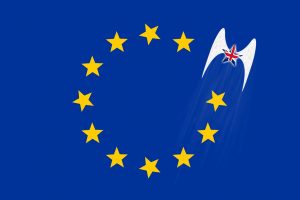
Stephen Booth
Head of the Britain in the World Project at Policy Exchange (2020-2022)
The Department for International Trade (DIT) has announced that the UK has concluded a historic new free trade agreement with Japan, the UK’s first major trade deal post-Brexit. The agreement is an important step towards the UK’s ambition to join the Comprehensive and Progressive Agreement for Trans-Pacific Partnership (CPTPP).
The UK-Japan Comprehensive Economic Partnership Agreement will replicate most of the existing agreement between Japan and the EU, which will no longer apply to the UK at the end of the Brexit transition period. Significantly, it will go further in some important areas, such as digital services and facilitating the movement of business people.
The final text is expected to be finalised in October but DIT notes that the deal will provide “improved market access for UK financial services – including greater transparency and streamlined application processes for UK firms seeking licences to operate in Japan.” UK import tariffs on automobile and railway parts will fall faster than they would have done under the existing EU deal.
Provisions on data and digital are expected to be modelled on the CPTPP approach, going beyond the previous EU deal in committing “to uphold the principles of net neutrality, as well as introducing a ban on data localisation, which will prevent British businesses from having the extra cost of setting up servers in Japan.” DIT suggests that this should help UK fintech firms operating in Japan, such as Revolut and Transferwise.
However, the UK appears to have achieved less than it hoped for on agriculture. The deal will see tariff reductions for UK pork and beef exports but Japan refused to give the UK any new quota on some sensitive food exports. Instead the UK will be able to use any spare quota unused by the EU for products such as Stilton cheese, tea extracts and bread mixes. The UK will hope to achieve further market access for these products under future negotiations to accede to the CPTPP.
DIT estimates that the UK-Japan Comprehensive Economic Partnership Agreement will increase UK GDP by 0.07% over the long run. Critics have suggested this is a small benefit. However, as I noted in a recent column for Conservative Home, putting aside valid questions about how accurately existing econometric models capture all the facets of comprehensive modern trade agreements, these types of numbers are not unique to UK trade agreements. The EU-Japan deal (the biggest ever completed by the EU) was estimated to boost EU GDP by 0.14%, a figure regarded by independent researchers as “plausible, though at the high end of the range of past estimates”.
Ultimately, beyond any quantifiable economic benefits, closer economic and political cooperation via trade agreements presents an opportunity for the UK to shape the course of regional or global developments with like-minded partners. The successful conclusion of the Japan agreement and future accession to the CPTPP will boost the economic and political relevance of the UK in the Indo-Pacific region, which is likely to host most of the world’s economic growth in the years ahead.
Related Content

Rees-Mogg will need Johnson’s full backing if he’s to deliver regulatory reform
All domestic Covid restrictions in England will end today, marking an important milestone as we emerge from an exceptional period of crisis. The macro-economic response to the pandemic understandably focused on damage limitation and maintaining employment, which has had a significant impact on the public finances. The painstaking work of supply-side reform has either taken a backseat or simply been overtaken by events. As I noted in my previous column, sections

Why be afraid of No Deal?
The risks can be managed and we still have some good bargaining chips, write Alexander Downer and Graham Gudgin.
